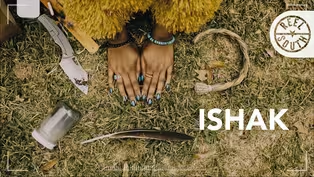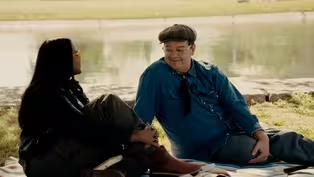
Ishak
Season 10 Episode 1003 | 13m 24sVideo has Closed Captions
A young woman is tapped to become the next chief of her tribe in southern Louisiana.
Filmmaker Maaliyah Papillion is tapped to learn the ways of her elders and carry on their sacred traditions as the next chief of the Atakapa-Išhak Nation, making her the second woman to lead the tribe since 1771.
Problems playing video? | Closed Captioning Feedback
Problems playing video? | Closed Captioning Feedback
Support for Reel South is made possible by the National Endowment for the Arts, the Center for Asian American Media and by SouthArts.

Ishak
Season 10 Episode 1003 | 13m 24sVideo has Closed Captions
Filmmaker Maaliyah Papillion is tapped to learn the ways of her elders and carry on their sacred traditions as the next chief of the Atakapa-Išhak Nation, making her the second woman to lead the tribe since 1771.
Problems playing video? | Closed Captioning Feedback
How to Watch REEL SOUTH
REEL SOUTH is available to stream on pbs.org and the free PBS App, available on iPhone, Apple TV, Android TV, Android smartphones, Amazon Fire TV, Amazon Fire Tablet, Roku, Samsung Smart TV, and Vizio.
Providing Support for PBS.org
Learn Moreabout PBS online sponsorship[ambient music] [tribal music] MAALIYAH PAPILLION (VOICEOVER): [non-english speech] The Ishak emerged from the water, instructed by the author of all things to do no evil.
From water to land, their territory expanded.
[tribal music] ♪ ♪ Connected to their past, they never forgot the ones who came before them.
[non-english speech] ♪ ♪ [non-english speech] We are together.
[insects trilling] Remember who you are and never forget where you came from.
This is a principle I've carried with me my whole life.
My name is Maaliyah Papillion, and I'm next in line to succeed the chief of the Atakapa Ishak Nation.
When this happens, this will make me the second woman to lead our tribe since 1771.
This is our story, a tale of what it means to be a Black Indian in the South and my attempt to save our history, land, and the people who lived there before everything washes away.
So I have these shells.
I've been collecting shells this whole time.
I've been in Africa, because they remind me of the shells that my ancestors used to use to build the mounds in Lake Charles.
And in my hometown, there's a street called Shelby's Drive.
And it's called Shelby's drive because of the Indian mounds that they found before they took them away to build that road.
So I'm going to take these home with me and probably make something out of them.
[waves lapping] MAALIYAH PAPILLION (VOICEOVER): My connection to my ancestors has never been lost, and I'm reminded of them everywhere I go.
I see them in the water around me.
I hear their cries in the wind.
I feel them in the land beneath me.
I see them in my dreams.
We can never be separated.
[somber music] ♪ ♪ - My sense of belonging to the land is-- it just brings me back to where I was born, tell told Lake Charles.
I was literally born in a place named after water.
There's not ever been a part of my life that hasn't involved water.
And so with that, it just, again, has me thinking about how I can give back to the land.
In the eighth grade, I was the science club president, and we actually tracked ways on how we can improve coastal wetlands and erosions.
And I just think back to, like, even at the age of 14, I was always thinking about how we could save the state.
(EMOTIONALLY) Because we need help.
We need help.
And so it's not just about making sure we have a place to live in the future.
It's about taking care of us right now.
[heavy music] ♪ ♪ MAALIYAH PAPILLION (VOICEOVER): --and I've always been connected to my heritage.
My father always made sure to remind me that I wasn't just one thing.
It was hard to explain to people, as I was growing up in Louisiana, what I am, and to get them to understand that, yes, I am native, but I'm also Black and Creole, too.
Many of the contemporary descendants of the Ishak are mixed race, which doesn't align with the government's standards of what makes a real Indian.
It's been a really interesting process working with the tribe for the past few years while advocating for our rights as Afro-Indigenous people.
When a tribe is seeking federal recognition, there are certain criteria that must be proved, which not every tribe can do.
In governmental systems that favor the one-drop rule and treaty agreements with the US, it leaves tribes like us left in the dust.
- Hi, my name is Shawn Papillion.
I'm Yukhiti Ishak.
That is the medicine man, the spiritual leader of the Atakapa-Ishak Nation.
I am proudly an Ishak, that is, the people.
And we are the people of the sunset and sunrise.
Louisiana is a curiosity when it comes to Aboriginal Indigenous people.
So when France owned Louisiana-- we're talking 1724-- they enacted what's called Code Noir.
And Code Noir was a law that was specifically meant to govern African slaves, people of African descent, Indigenous people, free people of color, people that they call mulattoes, Creoles, anything that you can say those are melanated people.
Those laws were meant to govern those people.
Code Noir made all Native Americans in Louisiana extinct.
And so as I was coming up, even my own people, Ishak people, in Louisiana history, you were taught that your people are extinct.
And I would kind of laugh to myself, because my people at home, we're still living.
We're-- we're not extinct.
Our ancestry can be and has been proven through oral tradition and scientific discovery to be in Louisiana some 10,000 years.
So we've never been extinct.
And we're proudly here today in contending that we're here, and we need to be identified on a state level.
So our kids and our kids' kids can have the benefit of what our ancestors left for us.
[bowl music] ♪ ♪ MAALIYAH PAPILLION (VOICEOVER): The current federal recognition system seems contradictory to me.
Because, as Indigenous people, we have been forced to seek out the recognition and aid of the United States to gain resources like land, access to clean water, food, rights to hunt, and all other rights to live on our land, when we actually were here first.
Within this system, we turn to the US government to grant us sovereignty when we were already sovereign nations.
Are we supposed to continue to wait on the government to give us the resources we need, especially in the face of climate change?
My answer is no.
We simply do not have the time to wait anymore.
We are in danger.
[wind rustling] This is the reason why I'm telling our story and making this film.
I want to educate others on the fact that we do exist and that we do have needs.
But I'm also hoping to formulate a solution for a problem that we didn't create for ourselves.
[wind rustling] ♪ ♪ - To be honest, I wasn't expected to be the chief of this tribe.
- --to get my people acknowledged.
I'm not looking for handouts.
I only want my people to acknowledge my ancestors and my people after me to be proud of who they are.
There are some of my family members, such as you, Maaliyah.
You have the same energy that I had when I picked this up.
Things happen for reasons, and the reasons you can't explain sometime.
They could be good or bad.
You've got to make the best of what's put it in front you.
That was put in front me to continue-- like I said, not for me, for my ancestors, those after me.
As I age, it's difficult for me to try to do everything that we've been doing in the past.
And to help a younger person, such as yourself, have the same energy that we have, that's a part of it now to carry it on, that's the feeling in my heart that makes me so proud of my great-niece.
MAALIYAH PAPILLION (VOICEOVER): Our tribal historian, Jeffery Darensbourg is amazing.
He's so many things, and he's been teaching me Ishakkoy, our native language, for the past two years.
He's also been helping me and the tribe reconnect with the language by using our dictionary, a recent language revitalization project that he's contributed to.
This work is really important because, at one point, Ishakkoy was considered a dormant language.
- --the language, you know, like, and even the little bit that I know.
But it gets you in touch with the minds of people, your ancestors, who can kind of still speak to you through those languages from-- - Yeah.
- --you know, a good distance.
- It's definitely been a huge influence on me, and it's felt like something I need to do, because I do want to teach my children how to speak their language.
MAALIYAH PAPILLION (VOICEOVER): Being from the South and being Indigenous and connected to the land is a huge responsibility.
I feel like my responsibility is not only to my family, but to the land as well, and ultimately to ensure that everyone in the state has a safe place to live.
I feel like because of the rapid coastal erosion we've been facing and the loss of access to land that has been a result, it's made my responsibility and desire to do something feel more urgent.
There's not a day that goes by that I don't think about how our state will be drastically different as soon as 2040, and how the water will continue to rise, making some parts of the state unlivable.
We can't let this happen.
We need to revisit our traditional land stewardship practices and honor the ways our ancestors took care of the land.
This isn't just about our community having the resources we need.
It's about the entire area being able to thrive.
[serene music] ♪ ♪ - --with modern technology to save our state and the people that live here.
A lot more has to be done to get us what we need in Southwest Louisiana, and I hope to see the day that our lives, our land, our dreams, and our spirits are taken care of.
We deserve to live in a world where all Native people can thrive, because after all, [non-english].
[bowl music] ♪ ♪ ♪ NARRATOR: Support for Reel South is provided by the ETV Endowment.
and the National Endowment for the Arts.
Additional funding for this program is provided by--
Video has Closed Captions
Preview: S10 Ep1003 | 19s | A young woman is tapped to become the next chief of her tribe in southern Louisiana. (19s)
Video has Closed Captions
Clip: S10 Ep1003 | 59s | Dr. Jeffery Darensbourg and Maaliyah Papillion reflect on the native language Ishakkoy. (59s)
Video has Closed Captions
Clip: S10 Ep1003 | 1m | An animation tells the story of the Ishak people. (1m)
Providing Support for PBS.org
Learn Moreabout PBS online sponsorshipSupport for PBS provided by:
Support for Reel South is made possible by the National Endowment for the Arts, the Center for Asian American Media and by SouthArts.


















